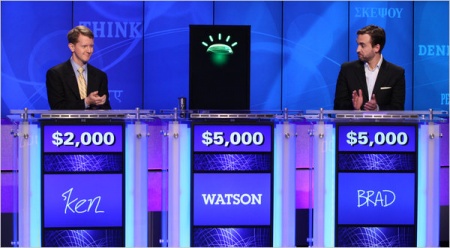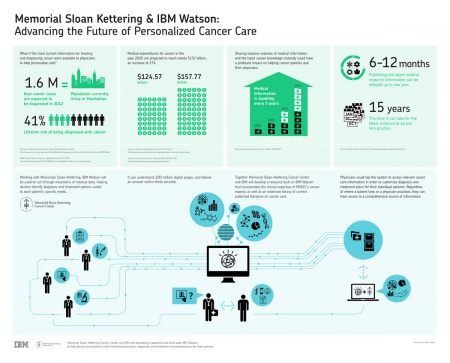Watson (computer)
Watson, the product of IBM's general laboratory, DeepQA, is a question answering supercomputer used to communicate in natural language. Its ability to cognitively compute was tested when it notably made an appearance on the game show Jeopardy! in 2011. [1] It was placed to match Jeopardy’s renowned contestants, Ken Jennings and Brad Rutter in a 2-day match. It won the 1 million dollar prize after correctly answering the final jeopardy answer. Throughout the match, Watson has no access to the internet but already contained terabytes of disk storage with the full text of Wikipedia and 200 million other pages. [1]
Watson uses human decoding methods to solve problems. Researchers developing this technology were at the forefront of creating an enhanced data machine that observed, interpreted, evaluate, and decide similar to human processes at extremely fast speeds. [2] Most of the data that Watson encounters is unorganized data almost 80% of what makes up the infosphere.
Currently, Watson is used at Memorial Sloan Kettering Cancer Center, New York City and at WellPoint, an insurance company to make moral decisions of lung cancer treatments. [1]
Contents
Software and Hardware
Watson uses complex high level thinking in several forms: natural language processing, information retrieval, knowledge representation and automated reasoning. This is made possible through IBM’s DeepQA Software and Apache UMIA framework. The system was coded in multiple languages including C++, JAVA and Prolog. [1]
Watson’s hardware base uses a massively parallel POWER7 processor to with ninety IBM Power 750 servers on a 3.5 GHz POWER7 eight-core. In total, the supercomputer has 16 terabytes of RAM. At this speed of processing, Watson is capable of retrieving 500 gigabytes per second or one million books in this time span. [1]
Jeopardy! Appearance
IBM communicated to Jeopardy’s producers on the possibility of a competition between Ken Jennings, who has the longest winning streak on the show and Brad Rutter, who accumulated the most money from the show. Upon agreeing, Watson was faced with multiple disparities that made it exploitable. For example, Watson could not pick categories based on interest so instead a third party chose categories for Watson. Watson was also not allowed to used an electronic buzzer because it would put Jennings and Rutter at a disadvantage. Watson was significantly faster than the two other competitors at hitting the buzzer. Watson also had to retrieve answers and chose the best answer shown to the viewers on a percentage bar. More often than none, Watson’s best answer was made with at least 50% accuracy and chose between 3 answers.[3] [4]
In preparation for the match, Watson also faced other former Jeopardy contestants to test its system. After a few tweaks, Watson was ready to face the two renowned champions of Jeopardy.
For the match, Watson was represented by a globe avatar. The match took place over two days and both contestants maintained secrecy of the match until it aired on January 14, 2011. After the first day, Watson maintained a substantial lead over the other two contestants. Watson ended with $35,734, Rutter with $10,400, and Jennings with $4,800. After the second day, all three scores were added up. Watson ended with $77,147, Jennings with $24,000 and Rutter with a score of $21,600. The prize money for 1st place was 1 million, followed by $300,000 for 2nd place and $200,000 for 3rd place. All three contestants donated the money to charity. [1] [4]
Ethical Implications
Watson has already taken higher level roles beyond its initial use on Jeopardy. Its current purpose revolves around making decisions for patients on treatment options for lung cancer. IBM Watson group has already explored the possibility of new roles in legal research, government and financial services. [5]With its updated roles, there is greater risk of ethical conundrums. [6]
Healthcare Role and Decision Making
Watson’s role in the Memorial Sloan Kettering Cancer Center has directed 90% of the decisions made by nurses. [7] [8]With 10% at stake, it presents a fear among medical professionals in its decision making. In statistics, presets of a 95% confidence level are used in the medical field thus Watson is shy 5%. The idea of Watson determining treatment options and the choice made at the end may be costly and may inadvertently incorrect. Even though patient autonomy is still conserved while using Watson, the fear is that Watson may be relied upon so heavily that patients may make decisions based on Watson’s data. [7] [9]Watson’s role as a decision maker visits the idea presented by Luciano Floridi in Information Ethics. Floridi claims that our reliance on artificial intelligence like Watson is based on “delegating or outsourcing to artificial agents our memories, decisions, routine tasks, and other activities”. [10]
Hacking
Though IBM claims its security revolving around Watson is quite fortified, it has not brushed off the idea of potential hackers. Recently, Watson has been used in crime fighting. One of IBM’s major tenets is “a peaceful global community”. [11] Watson currently has access to numerous databases from law enforcement and police departments. Retrieval of this information along with patient records breach privacy rights from all angles. [12] Now, this is unlikely however Watson can be targeted from any country and hacking into its database may be detrimental.
See also
External links
- Watson homepage
- DeepQA homepage
- About Watson on Jeopardy.com
- Smartest Machine on Earth (PBS NOVA documentary about the making of Watson)
- Power Systems
- The Watson Trivia Challenge. The New York Times. June 16, 2010.
References
- ↑ 1.0 1.1 1.2 1.3 1.4 1.5 https://en.wikipedia.org/wiki/Watson_(computer)
- ↑ https://www.youtube.com/watch?v=_Xcmh1LQB9I
- ↑ http://www.nytimes.com/interactive/2010/06/16/magazine/watson-trivia-game.html?_r=0
- ↑ 4.0 4.1 https://www.jeopardy.com/jbuzz/highlights/watson-ibm
- ↑ http://www.techrepublic.com/article/ibm-watson-the-inside-story-of-how-the-jeopardy-winning-supercomputer-was-born-and-what-it-wants-to-do-next/
- ↑ https://www.ibm.com/us-en/marketplace/cognitive-customer-engagement
- ↑ 7.0 7.1 https://www.mskcc.org/about/innovative-collaborations/watson-oncology
- ↑ https://www.ibm.com/watson/health/
- ↑ http://www.wired.co.uk/article/ibm-watson-medical-doctor
- ↑ https://www-cambridge-org.proxy.lib.umich.edu/core/services/aop-cambridge-core/content/view/E3D36AB945CC8B4AEC94DD7F2F9343D5/9780511845239c5_p77-98_CBO.pdf/information-ethics.pdf
- ↑ http://www-03.ibm.com/ibm/history/ibm100/us/en/icons/crimefighting/transform/
- ↑ http://www.forbes.com/forbes/welcome/?toURL=http://www.forbes.com/sites/matthewherper/2017/02/19/md-anderson-benches-ibm-watson-in-setback-for-artificial-intelligence-in-medicine/&refURL=https://www.google.com/&referrer=https://www.google.com/

